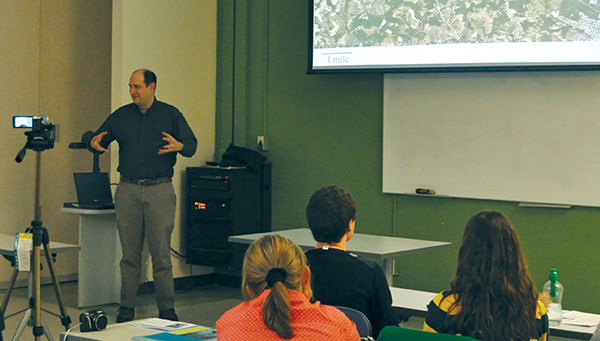
Brady Porter, an associate professor of biological sciences at Duquesne University’s Center of Environmental Research and Education, delivered a lecture at Binghamton University Thursday on the environmental effects of hydraulic fracturing, or “fracking,” a method of drilling for natural gas.
Porter’s talk was the last in a series of four lectures about fracking that have been sponsored on campus this semester by BU’s chapter of New York Public Interest Research Group (NYPIRG). NYPIRG, a statewide activist organization, is opposed to the drilling practice.
Each of the lectures in the series focused on a different aspect of the effects of fracking. Porter’s lecture was titled “Ecological and Biological Impacts of Large-Scale Horizontal Hydrofracturing.”
Porter, who specializes in aquatic systems and fish, began his talk by explaining that all the evidence he prepared came from news media and that there is a lack of sufficient data on the subject as a result of the limited amount of scientific research that has been conducted on the subject.
Porter discussed fracking that is underway in Pennsylvania, his home state. Pennsylvania and portions of New York sit on top of the Marcellus Shale formation, a layer of subsurface rock stretching beneath several states that contains one of the country’s largest deposits of natural gas. Unlike Pennsylvania, New York has imposed a moratorium on fracking until the release of further scientific studies.
Using a slide show, Porter displayed images, numbers and charts that described fracking’s impacts on the natural ecosystem as negative.
Porter said fracking contributed to a decline in biodiversity due to habitat destruction, pollution and pesticide use, human activity and overuse of land. He claimed that government agencies could not foresee how much damage fracking will eventually cause.
“New Yorkers and Pennsylvanians are used to seeing vertical drilling and do not think this will be so bad,” Porter said. “This operation is bigger than drilling though.”
He also pointed to the potential for contamination of drinking water due to the overflow and spillage of fracking wastewater, which contains chemicals used in the drilling process, and he complained about the lack of responsible monitoring of pollution in drinking water or oversight for wastewater disposal.
“No one is coordinating. The right hand, the left hand, the right foot and the left foot are doing something different all at once,” Porter said.
He said numerous times that waste created from fracking has been dumped into the state’s waterways without being treated to remove contaminants.
The lecture was attended by about 15 people, most of them members of NYPIRG, and a few professors from BU’s geology and biology departments.
“The other programs had more people than this one,” said Brendan Woodruff, a NYPIRG staff person who is working with the BU chapter this semester on its anti-fracking campaign, referring to the previous lectures in the series. “Today [had] nice weather and there were other programs going on at the same time which is why attendance was low.”
The students who attended expressed an interest in learning more about fracking and how to help protect the environment.
“I’m in NYPIRG and I live in the area. I like to be familiar with the topic,” said Eric Moring, a junior majoring in environmental studies. “The better informed I am the more ways I can learn to prevent it.”
John Titus, a BU professor of biology and director of a group called Center for Integrated Watershed Systems, said he attended because he was interested in the possibility of collaborating with other groups.
“I am interested in water quality and in collaborating with groups like ours to work on this,” Titus said.
Dylan Horvath, the steward of natural areas on campus, including the Nature Preserve, said that he found the lecture very informative. Horvath called Porter knowledgeable in the subject area and said that he learned more from Porter than from any of the other lecturers in the series.
“This is important to me because many students ask my opinion on hydraulic fracturing and I like to have interesting information to give them,” Horvath said.


